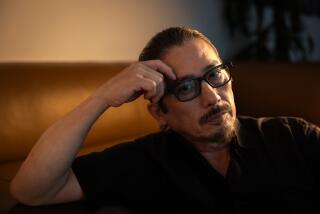MOVIE REVIEW : COMMON MAN CAUGHT IN THE WARS OF RICH MEN
- Share via
Kihachi Okamoto’s “Tokkan” and “The Human Bullet” (at the Nuart Sunday through next Saturday) view chaotic historic events from the point of view of the powerless ordinary man and are dazzling revisionist satires from the director of such frequently revived samurai movies as “Sword of Doom” and “Samurai Assassin.”
Made in 1975, the first is set in 1868, the year in which the military dictatorship that ruled Japan for three centuries at last fell to imperial forces; the second takes place in the final days of World War II.
Don’t worry if you find it hard to follow the plot of “Tokkan,” because the film’s meaning is clear enough by its finish. (The uninitiated, however, may not realize what a challenge the film presents to the traditional view that the restoration of the Emperor’s power was a victory for democracy.) In a very real sense its country bumpkin heroes Senta (Toshitaka Ito) and Manjiro (Yusuke Okada) are just as confused as we are as the Sendai and Aizu clans of northern Japan make a last beleaguered stand against the Emperor’s armies. Senta and Manjiro are innocents, doubtlessly illiterate, yet are shrewd enough to understand that in the chaos of war they just might get their one chance to rise from poverty-stricken farmers to prosperous merchants.
But as the film unfolds deceptively as a robust, rambunctious action comedy, Okamoto’s perspective gradually emerges, revealing that men like Senta and Manjiro are but naive pawns in the eternal struggle for political power waged by men at the top who really have no interest in the lot of the common man. Yet an Everyman like Senta or Manjiro, who quite literally would rather make love than war--these guys never miss a chance to have sex--somehow survive, their offspring enduring one war after another, from one generation to the next. “Tokkan” brings to mind Altman’s “McCabe and Mrs. Miller,” not merely in its sentiments and detachment but also in its earthy humor and the lushness of its rural settings.
Okamoto made “The Human Bullet” (1968) in reaction to his own 1967 film “The Emperor and the General,” a meticulous, objective but tedious account of the 24 hours leading up to Japan’s unconditional surrender, which utterly neglected the impact of World War II on the ordinary soldier. “The Human Bullet” commences with a 24-hour leave granted its skinny, virginal young hero (Minoru Terada) before he’s to climb in an oil drum lashed to a torpedo that he is to aim at any Allied warship attempting to invade Japanese soil, sacrificing his own life, kamikaze-style, in the process. Just about every absurdity of war and human behavior is skewered during the film’s long philosophical passages. Shot in a dramatically high contrast black and white, “The Human Bullet,” like “Tokkan,” offers a darkly humorous, disturbingly dislocated vision of life.
More to Read
Only good movies
Get the Indie Focus newsletter, Mark Olsen's weekly guide to the world of cinema.
You may occasionally receive promotional content from the Los Angeles Times.










